List of Nobel laureates affiliated with Kyoto University
Ten Nobel laureates have been affiliated with Kyoto University. The building pictured is Clocktower.
The Nobel Prizes are awarded annually by the Royal Swedish Academy of Sciences, the Karolinska Institute, and the Norwegian Nobel Committee to individuals who make outstanding contributions in the fields of chemistry, physics, literature, peace, and physiology or medicine.[1] As of 2018, 18 Nobel laureates have been associated with Kyoto University (KU), it has the most Nobel laureates of all universities in Asia.
Summary
| Category | Official Count | Others with KU related | Total | Remarks |
|---|---|---|---|---|
| Physics | 5 | 3 | 8 | Hideki Yukawa is also the first Japanese Nobel laureate |
| Chemistry | 2 | 2 | 4 | |
| Physiology or Medicine | 3 | 1 | 4 | |
| Literature | - | - | - | |
| Peace | - | 1 | 1 | |
| Economic Sciences | - | 1 | 1 | |
| Total | 10 | 8 | 18 |
Laureates
The following 10 Nobel laureates from the official list of Kyoto University, it includes 7 formal alumni.[2]
| Year | Image | Laureate | Relation | Category | Rationale |
|---|---|---|---|---|---|
| 1949 | 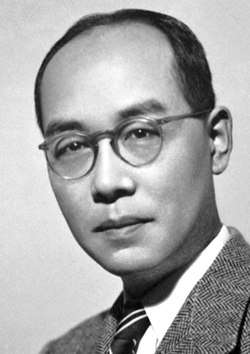 |
Hideki Yukawa | Alumnus Faculty |
Physics | "for his prediction of the existence of mesons on the basis of theoretical work on nuclear forces".[3] |
| 1965 | 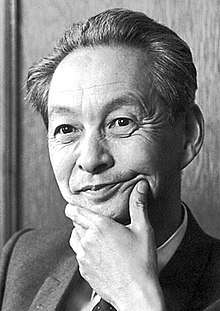 |
Sin-Itiro Tomonaga | Alumnus | Physics | "for their fundamental work in quantum electrodynamics, with deep-ploughing consequences for the physics of elementary particles" – shared with Julian Schwinger and Richard Feynman.[4] |
| 1981 | 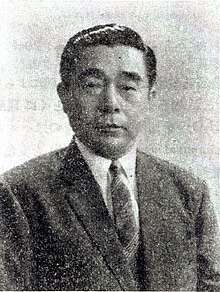 |
Kenichi Fukui | Alumnus; D.Eng Faculty |
Chemistry | "for their theories, developed independently, concerning the course of chemical reactions" – shared with Roald Hoffmann.[5] |
| 1987 | 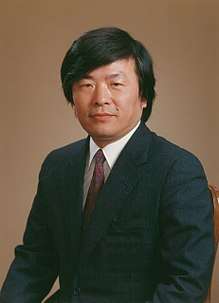 |
Susumu Tonegawa | Alumnus | Physiology or Medicine | "for his discovery of the genetic principle for generation of antibody diversity."[6] |
| 2001 | 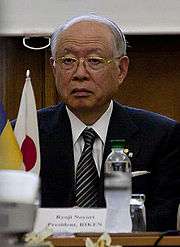 |
Ryōji Noyori | Alumnus; D.Eng | Chemistry | "for their work on chirally catalysed hydrogenation reactions" – shared with William Knowles and Barry Sharpless.[7] |
| 2008 | 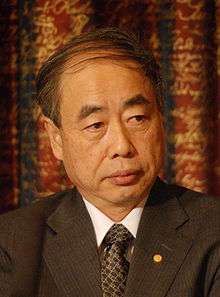 |
Makoto Kobayashi | Faculty (1972-1979) | Physics | "for the discovery of the origin of the broken symmetry which predicts the existence of at least three families of quarks in nature" – shared with Yoichiro Nambu and Toshihide Maskawa.[8] |
 |
Toshihide Maskawa | Faculty (1980-2003); honorary professor | Physics | "for the discovery of the origin of the broken symmetry which predicts the existence of at least three families of quarks in nature" – shared with Yoichiro Nambu and Makoto Kobayashi.[8] | |
| 2012 | 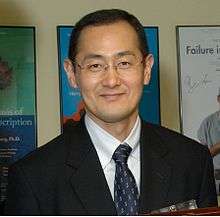 |
Shinya Yamanaka | Faculty | Physiology or Medicine | "for the discovery that mature cells can be reprogrammed to become pluripotent" – shared with John B. Gurdon.[9] |
| 2014 | 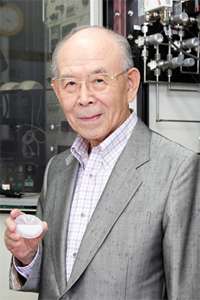 |
Isamu Akasaki | Alumnus | Physics | "for the invention of efficient blue light-emitting diodes which has enabled bright and energy-saving white light sources" – shared with Hiroshi Amano and Shuji Nakamura.[10] |
| 2018 |  |
Tasuku Honjo | Alumnus Faculty |
Physiology or Medicine | "for their discovery of cancer therapy by inhibition of negative immune regulation" – shared with James P. Allison.[11] |
Laureates with KU related
The following 8 Nobel Laureates with Kyoto University related.
| Year | Image | Laureate | Relation | Category | Rationale |
|---|---|---|---|---|---|
| 1955 |  |
Willis Lamb | Visiting fellow (1955) | Physics | "for his discoveries concerning the fine structure of the hydrogen spectrum" – shared with Polykarp Kusch.[12] |
| 1973 |  |
Leo Esaki | The Third High School Alumni | Physics | "for their experimental discoveries regarding tunneling phenomena in semiconductors and superconductors, respectively" – shared with Ivar Giaever and Brian Josephson[13] |
| 1991 | .jpg) |
Aung San Suu Kyi | Visiting fellow (1985-1986) | Peace | "for her non-violent struggle for democracy and human rights".[14] |
| 2000 |  |
Alan MacDiarmid | Visiting fellow (2000) | Chemistry | "for the discovery and development of conductive polymers" – shared with Alan J. Heeger and Hideki Shirakawa.[15] |
| 2003 | 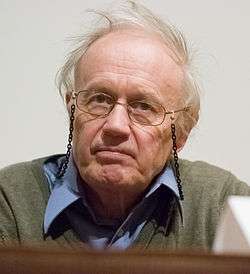 |
Anthony James Leggett | Group member of Prof. Takeo Matsubara (1960s) | Physics | "for pioneering contributions to the theory of superconductors and superfluids"" – shared with Alexei Alexeyevich Abrikosov and Vitaly Lazarevich Ginzburg.[16] |
| 2004 |  |
Aaron Ciechanover | Visiting fellow (2004) | Chemistry | "for the discovery of ubiquitin-mediated protein degradation" – shared with Avram Hershko and Irwin Rose.[17] |
| 2009 | 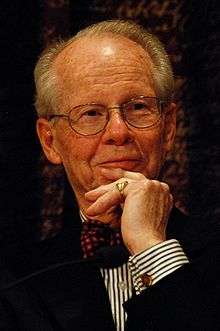 |
Oliver Williamson | Visiting fellow (2005) | Economic Sciences | "for his analysis of economic governance, especially the boundaries of the firm" – shared with Elinor Ostrom.[18] |
| 2016 | .jpg) |
Yoshinori Ohsumi | Graduate school Attend (1970s) | Physiology or Medicine | "for his discoveries of mechanisms for autophagy".[19] |
See also
References
- ↑ "Alfred Nobel – The Man Behind the Nobel Prize". Nobel Foundation. Retrieved 2008-10-18.
- ↑ Kyoto University | Facts & Figures
- ↑ "The Nobel Prize in Physics 1949". Nobel Foundation. Retrieved 19 December 2009.
- ↑ "The Nobel Prize in Physics 1965". Nobel Foundation. Retrieved 19 December 2009.
- ↑ "The Nobel Prize in Chemistry 1981". Nobel Foundation. Retrieved 19 December 2009.
- ↑ "The Nobel Prize in Physiology or Medicine 1987". Nobel Foundation. Retrieved 19 December 2009.
- ↑ "The Nobel Prize in Chemistry 2001". Nobel Foundation. Retrieved 19 December 2009.
- 1 2 "The Nobel Prize in Physics 2008". Nobel Foundation. Retrieved 19 December 2009.
- ↑ "The Nobel Prize in Physiology or Medicine 2012". Nobel Foundation. Retrieved 24 August 2015.
- ↑ "The Nobel Prize in Physics 2014". Nobel Foundation. Retrieved 24 August 2015.
- ↑ "The Nobel Prize in Physiology or Medicine 2018". Nobel Foundation. Retrieved 2018-10-01.
- ↑ "The Nobel Prize in Physics 1955". Nobel Foundation. Retrieved 1 October 2018.
- ↑ "The Nobel Prize in Physics 1973". Nobel Foundation. Retrieved 1 October 2018.
- ↑ "The Nobel Peace Prize 1991". Nobel Foundation. Retrieved 1 October 2018.
- ↑ "The Nobel Prize in Chemistry 2000". Nobel Foundation. Retrieved 1 October 2018.
- ↑ "The Nobel Prize in Physics 2003". Nobel Foundation. Retrieved 1 October 2018.
- ↑ "The Nobel Prize in Chemistry 2004". Nobel Foundation. Retrieved 1 October 2018.
- ↑ "The Sveriges Riksbank Prize in Economic Sciences in Memory of Alfred Nobel 2009". Nobel Foundation. Retrieved 1 October 2018.
- ↑ "The Nobel Prize in Physiology or Medicine 2016". Nobel Foundation. Retrieved 1 October 2018.
External links
This article is issued from
Wikipedia.
The text is licensed under Creative Commons - Attribution - Sharealike.
Additional terms may apply for the media files.